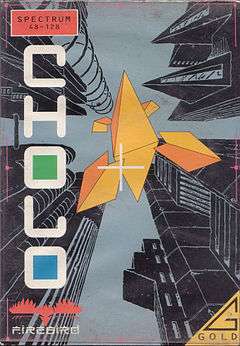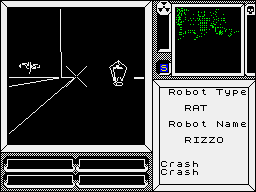Cholo (video game)
| Cholo | |
|---|---|
 | |
| Developer(s) | Solid Image Ltd (Glyn Williams, Joey Headen) |
| Publisher(s) | Firebird |
| Platform(s) |
BBC Micro (original) Amstrad CPC, C64, ZX Spectrum |
| Release date(s) | 1986 |
| Genre(s) | First-person shooter, Vehicle simulation game |
| Mode(s) | Single player |
Cholo is a wireframe 3D computer game with nonlinear gameplay originally released in 1986 for the BBC Micro. It was ported to the ZX Spectrum, Amstrad CPC, and Commodore 64.
Description
Cholo's gameplay is similar to that of Paradroid, but with wireframe graphics. The story is set out in a novella which was included in the game's packaging. Following a nuclear war, humanity is trapped underground by a robot defence system that rules the irradiated surface. Your character assumes control of a robot drone, transmitting to a terminal below ground, and is given the task of freeing the trapped humans.
The robot - "Rizzo the rat", a diagnostic model - is equipped with a single laser, computer/robot link capabilities and very limited armour. The player's first task is to explore the city and take over stronger robots in order to complete the mission. Gameplay consists of movement around a virtual 3D world, taking over other robots by shooting them until 'paralysed', running into them and entering a password to gain access.
Each robot has different properties. "Aviata" is an aircraft who can fly, and transport other robots; "Igor" is a hacker who can access computer systems. The player can only control one robot at a time. All robots have four slots for 'rampacks' which are essentially files, either text files or programs which add extra functionality to your robot. The gameplay often involves swapping between robots in order to complete a certain task.
Robot types
There are a number of different robot types in Cholo, nearly all of which can be controlled at some point in the game. These include:

- Vidbot - Fixed position camera robot
- Leadcoat - Heavy duty radiation proof robot
- Ratdroid - Diagnostic robot
- Hacker - Hacker robot (unarmed)
- Flying Eye - Mobile camera robot
- Autodoc - Maintenance robot
- Guard - Police robot
- Grundon - Police tank robot
- Flyboy - Aircraft robot
- Ship - Ship robot
Map
This deliberately incomplete map showing the pre-war city shipped with the game in the form of an A3 size poster. The map also contains a partial robot identification chart.
External links
- Cholo at World of Spectrum
- Full CHOLO novella text at ovine.net (Web Archive)
- Images of Commodore 64 version of Cholo box and manual at C64Sets.com